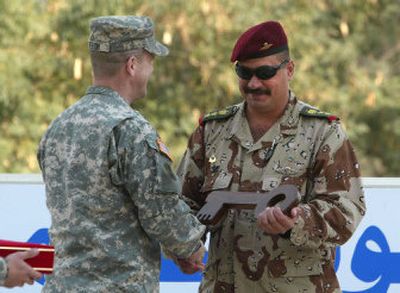Iraq reality check: year four

BAGHDAD, Iraq – Such terms as “victory” and “mission accomplished” aren’t heard much anymore as the United States enters its fourth year of war in Iraq.
Today’s slogans are “political process” and handing over “battle space” to Iraq’s new army so the Iraqis themselves can carry the fight against the insurgents and build their promised democracy.
All those plans are under review in light of another ominous phrase – “civil war” – that has crept into the debate since the latest sectarian violence set off by a Feb. 22 bombing at a Shiite Muslim mosque in Samarra.
The shift from the upbeat slogans of 2003 represents an acknowledgment by the U.S. command that the war against an insurgency dominated by Iraq’s Sunni Arab minority cannot be won by military might alone.
Instead, the best chance for peace is to encourage the insurgents to lay down their arms and join the political process, while building up an Iraqi force capable of dealing with those who refuse.
But slogans obscure the complexities at play. The rising tensions between Sunnis and Shiites raise the new question of whether building up Iraq’s army forces – the supposed solution – might instead set the stage for civil war.
How events play out in the coming months will determine how long U.S. troops remain in Iraq – and in what numbers. All signs point to a lengthy American commitment in Iraq, even if Washington draws down significant numbers of troops this year as expected.
At no time since the fall of Saddam Hussein have the words “Iraq stands at a crossroad” been truer. The next few months will determine whether Iraq is on the threshold of recovery or brink of disaster.
As the fourth year of war approaches, the American strategy is moving along two tracks: encouraging a broad-based government of national unity that can win trust from all communities and transferring security responsibility to the new Iraqi army and police.
Both tracks are well under way, but fraught with risks.
The violence that swept Baghdad and other areas after the Samarra shrine attack suggests the Sunni-dominated insurgency could change into a full-scale civil war between the rival Muslim sects.
In the March issue of Foreign Affairs, Stephen Biddle of the Council on Foreign Relations argues that Washington should slow the expansion of Iraq’s security forces – most of whom are Shiites and Kurds – until there is a “broad communal compromise.”
For the time being, however, the process of placing an Iraqi face on the war is accelerating.
About 60 of Iraq’s 102 battalions “control their own battle space,” said Lt. Col. Michael J. Negard, a U.S. military spokesman. That means they plan and carry out military operations within their area of responsibility.
If all goes according to plan, by the end of the year all Iraqi battalions – expected by then to number 112 – will have that status.
Assuming the Iraqis prove up to the task, the U.S. military can begin sending thousands of soldiers home. The top commander in Iraq, Gen. George W. Casey Jr., is expected to recommend reductions in the 136,000-strong force beginning this spring.
Casey refuses to talk publicly about numbers. But it is widely assumed U.S. troop strength in Iraq will fall below 100,000 by the end of the year or by early 2007. Privately, American officers say that figure is reasonable.
Pentagon estimates, however, have proven wrong before. In late 2003, the Pentagon predicted troop strength would drop to 105,000 by the following May. Instead, insurgent attacks forced an increase to nearly 140,000 in mid-2004.
U.S. officials have praised the performance of Iraqi soldiers. But the Americans were equally optimistic in 2004 until many Iraqi units fell apart in battle. The entire 5,000-member police force in Mosul deserted after an insurgent uprising in November 2004.
This time, the U.S. command insists training is better. Measures have been taken to build up a strong cadre of noncommissioned officers – a major weakness in 2004.
Privately, however, U.S. officers say desertions and absences still dog Iraqi units, especially in the volatile west where hundreds of soldiers have left their commands since a November offensive.
This is where the political track comes in. The December election raised the amount of Sunni Arab representation in the new parliament more than threefold. Talks are under way to put together a unity government with participation by Sunni Arabs, Shiite Muslims and Kurds.
At the same time, U.S. Ambassador Zalmay Khalilzad has been reaching out to Sunni leaders in insurgent strongholds such as Ramadi. The process is continuing, despite the assassinations of local Sunnis willing to talk.
But success won’t come quickly.
“Even if a broad inclusive national government emerges, there almost certainly will be a lag time before we see a dampening effect on the insurgency,” the U.S. national intelligence chief, John Negroponte, a former ambassador in Iraq, told a Senate committee Feb. 2.